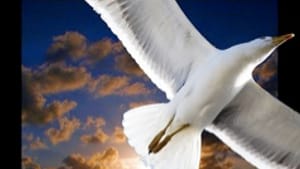Stay in the Loop
BSR publishes on a weekly schedule, with an email newsletter every Wednesday and Thursday morning. There’s no paywall, and subscribing is always free.
The concert pianist's life: My problem with Jonathan Livingston Seagull
A pianist reconsiders "Jonathan L. Seagull'

When I heard that Alexandra Munn was recuperating from a cancer operation, I knew I had to pay her a visit. She taught me piano for 12 years, but I hadn't seen Miss Munn (who instructed me to call her Sandra after I earned my bachelor's degree) in a long time, mainly because she lives in Edmonton, Alberta and I now live in Lancaster, Pa.
As it turned out, I was scheduled to be near Edmonton shortly after her surgery to play a benefit recital for a church in my hometown. I found Sandra frail but in good spirits, still a woman of strong opinions (who told me we were like two brick walls and that I let her win, but not always). My children were with me, and in the course of conversation my 13-year-old daughter Kiana mentioned her love of musical theater, writing and film. Sandra encouraged Kiana to follow her dreams, sending her off at the end of the visit with a copy of Richard Bach's 1972 bestseller, Jonathan Livingston Seagull.
Ah, Jonathan, who was assigned to Miss Munn's students over the years as inspirational reading. Jonathan, you may recall, follows his own path rather than succumbing to the prescribed mediocrity of the flock, and does it for the noblest of reasons. Jonathan also learns not to hold a grudge against those who banished him for his failure to conform (and, in fairness, his nearly killing a young bird during an experiment in high speed flight).
What I missed
I understood the message, but it never quite found its way to my core. Still, I was very young when I read about Jonathan— I figured that Sandra's gift to Kiana was a chance for me to revisit the book, with the benefit of a mature perspective. Maybe I'd find what I missed the first time.
A perfect opportunity presented itself on the day of my concert. Some people find time alone just prior to a solo performance for centering; I'm usually either bored or increasingly anxious, so I tend to arrive on the late side. This time my mother needed to be there early to help, so I was glad for Jonathan Livingston Seagull as a way to fill the time before the concert and, as it turned out, during the extended intermission, whose duration was meant to facilitate a silent auction.
I get it, I really do, but I'm still no Jonathan, and I don't really want to be. On one hand, I have definite symptoms of perfectionism, and I often say that the joy of playing the piano well validates the many hours spent achieving that goal. I agree that we can't overcome our limitations without first believing in the possibility of doing so. And it's commendable that Jonathan shares his knowledge with others, learning to love them as he does—to these things, I relate.
Where are the kids?
On the other hand, is anything worth the degree of single-mindedness depicted in the book? Long hours alone, not even pausing to eat? Isolation except from those with the same burning vision, whose companionship is transient, since attaining a higher level of achievement means leaving behind yet another suddenly common flock (no surprise that there are no little Jonathans in the book)?
Is this what living beings must do to be truly "free"? (Bach isn't the first to suggest this— the Apostle Paul says similar things about the value of being both single and single-minded if one really wants to serve the Lord).
I returned to my hometown mentally tired, but I pushed through my fatigue because I wanted to do the music justice. I succeeded in that my audience was thrilled. But I failed in the sense that I know that if I'd pushed myself a little harder, I could have been thrilled rather than merely satisfied.
Since I'm not Jonathan, I had asked my parents if they'd mind taking my kids and me to the Rocky Mountains, which Kiana and Malcolm had never seen. I lost a day of practice there, and another after visiting the zoo with my family, when I was too tired to practice. I could have spent more time at the piano on other days as well, but I was burnt out, which, in Jonathan language, means not committed enough to perfection.
Not a great concert, but….
As a result, I gave a lovely concert, but not a transcendent one. Still, the audience loved it, everyone in my family enjoyed time spent together, I hung out with a few old friends, and a large sum of money was raised for the sponsoring church.
Is that enough? There was a time when it wouldn't have been— when listening to a recording of myself and noting things I could have done differently would depress me for days. This time, however, I merely filed my imperfections away to be corrected in the future, secure in the knowledge that I know what to do.
I still like to soar, but, unlike Jonathan Livingston Seagull, I realize it isn't the only thing in my life that matters. And that this realization is perfectly OK.♦
To read a follow-up comment, click here.
As it turned out, I was scheduled to be near Edmonton shortly after her surgery to play a benefit recital for a church in my hometown. I found Sandra frail but in good spirits, still a woman of strong opinions (who told me we were like two brick walls and that I let her win, but not always). My children were with me, and in the course of conversation my 13-year-old daughter Kiana mentioned her love of musical theater, writing and film. Sandra encouraged Kiana to follow her dreams, sending her off at the end of the visit with a copy of Richard Bach's 1972 bestseller, Jonathan Livingston Seagull.
Ah, Jonathan, who was assigned to Miss Munn's students over the years as inspirational reading. Jonathan, you may recall, follows his own path rather than succumbing to the prescribed mediocrity of the flock, and does it for the noblest of reasons. Jonathan also learns not to hold a grudge against those who banished him for his failure to conform (and, in fairness, his nearly killing a young bird during an experiment in high speed flight).
What I missed
I understood the message, but it never quite found its way to my core. Still, I was very young when I read about Jonathan— I figured that Sandra's gift to Kiana was a chance for me to revisit the book, with the benefit of a mature perspective. Maybe I'd find what I missed the first time.
A perfect opportunity presented itself on the day of my concert. Some people find time alone just prior to a solo performance for centering; I'm usually either bored or increasingly anxious, so I tend to arrive on the late side. This time my mother needed to be there early to help, so I was glad for Jonathan Livingston Seagull as a way to fill the time before the concert and, as it turned out, during the extended intermission, whose duration was meant to facilitate a silent auction.
I get it, I really do, but I'm still no Jonathan, and I don't really want to be. On one hand, I have definite symptoms of perfectionism, and I often say that the joy of playing the piano well validates the many hours spent achieving that goal. I agree that we can't overcome our limitations without first believing in the possibility of doing so. And it's commendable that Jonathan shares his knowledge with others, learning to love them as he does—to these things, I relate.
Where are the kids?
On the other hand, is anything worth the degree of single-mindedness depicted in the book? Long hours alone, not even pausing to eat? Isolation except from those with the same burning vision, whose companionship is transient, since attaining a higher level of achievement means leaving behind yet another suddenly common flock (no surprise that there are no little Jonathans in the book)?
Is this what living beings must do to be truly "free"? (Bach isn't the first to suggest this— the Apostle Paul says similar things about the value of being both single and single-minded if one really wants to serve the Lord).
I returned to my hometown mentally tired, but I pushed through my fatigue because I wanted to do the music justice. I succeeded in that my audience was thrilled. But I failed in the sense that I know that if I'd pushed myself a little harder, I could have been thrilled rather than merely satisfied.
Since I'm not Jonathan, I had asked my parents if they'd mind taking my kids and me to the Rocky Mountains, which Kiana and Malcolm had never seen. I lost a day of practice there, and another after visiting the zoo with my family, when I was too tired to practice. I could have spent more time at the piano on other days as well, but I was burnt out, which, in Jonathan language, means not committed enough to perfection.
Not a great concert, but….
As a result, I gave a lovely concert, but not a transcendent one. Still, the audience loved it, everyone in my family enjoyed time spent together, I hung out with a few old friends, and a large sum of money was raised for the sponsoring church.
Is that enough? There was a time when it wouldn't have been— when listening to a recording of myself and noting things I could have done differently would depress me for days. This time, however, I merely filed my imperfections away to be corrected in the future, secure in the knowledge that I know what to do.
I still like to soar, but, unlike Jonathan Livingston Seagull, I realize it isn't the only thing in my life that matters. And that this realization is perfectly OK.♦
To read a follow-up comment, click here.
Sign up for our newsletter
All of the week's new articles, all in one place. Sign up for the free weekly BSR newsletters, and don't miss a conversation.
 Maria Thompson Corley
Maria Thompson Corley